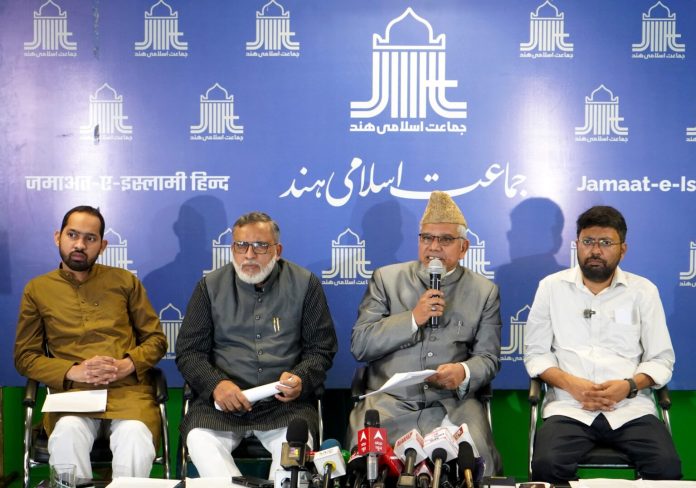New Delhi : In a strongly-worded press conference held on Saturday, Jamaat-e-Islami Hind (JIH) voiced grave concerns over the ongoing Special Intensive Revision (SIR) of electoral rolls in Bihar, the increasing deportation of Bengali-speaking Muslims without due process, and the recent verdict in the 2008 Malegaon blast case.
JIH Vice-President Prof. Salim Engineer called for the immediate suspension of the SIR exercise in Bihar until a proper judicial or parliamentary review is conducted. He criticized the Election Commission of India (ECI) for rejecting documents such as Aadhaar, voter ID, and ration cards as proof for voter registration. Prof. Salim warned that these actions could result in mass disenfranchisement, especially targeting poor and marginalized communities, with Muslims likely to be disproportionately affected.
He noted discrepancies in document acceptance across different districts and highlighted that four Muslim-majority districts in Seemanchal—Araria, Kishanganj, Purnea, and Katihar—were facing systematic rejections. This, he alleged, has given the process a communal tint. He also questioned the ECI’s authority in verifying citizenship, stating that such matters fall under the Ministry of Home Affairs.
Prof. Salim asserted that the ECI’s core responsibility is to ensure every eligible citizen is registered to vote, and accused the Commission of acting under political pressure to manipulate voter demographics in favor of a particular party.
Adding to the concerns, Nadeem Khan, National Secretary of the Association for Protection of Civil Rights (APCR), demanded an end to the illegal detention and deportation of Bengali-speaking Muslims in states like Gujarat, Rajasthan, Haryana, and Delhi. He accused law enforcement agencies of targeting Indian citizens from West Bengal under the false pretext of them being Bangladeshi nationals.
Khan revealed that approximately two lakh Bengali-speaking Muslims had been living in Gurgaon, but police intimidation forced nearly 90% of them to flee back to West Bengal. He emphasized that Muslims constitute nearly 27% of the state’s population and that the targeting is based on religious and linguistic profiling.
He also exposed that over 3,000 such individuals had been forcibly deported to Bangladesh, only to be sent back after authorities there confirmed their Indian citizenship. In a deeply disturbing revelation, he reported that around 150 Rohingya Muslims were pushed back, with 40 allegedly thrown into the sea near the Andaman Islands, some of whom were later rescued by the Indian Navy.
Khan called for an immediate halt to such inhumane practices and demanded an independent investigation into the actions of police personnel involved in detentions and abuse.
Addressing the recent acquittals in the 2008 Malegaon blast case, JIH National Vice-President Malik Moatasim Khan expressed serious concern over the judicial outcome. He said the verdict has left important questions around justice, accountability, and transparency unanswered.
Khan referenced the original Maharashtra ATS investigation led by the late Hemant Karkare, which reportedly uncovered significant evidence of a coordinated terror conspiracy. However, he criticized the National Investigation Agency (NIA) for its handling of the case post-2014, implying political interference may have compromised the probe.
The NIA court recently acquitted all accused, including BJP MP Pragya Singh Thakur and Lt. Col. Prasad Purohit. Khan questioned why, despite 17 years of investigation, the agencies failed to build a robust case. He also asked whether the government would appeal the verdict with the same urgency it shows in cases involving Muslim accused.
Khan insisted that the issue is not about targeting any acquitted individual, but about restoring public confidence in the impartiality of the judiciary and investigative institutions. He demanded accountability for investigative lapses and urged a judicial review into whether political or ideological biases influenced the final outcome.




